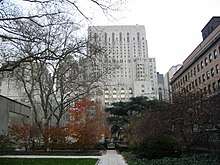Tri-Institutional MD–PhD Program
The Tri-Institutional MD-PhD Program is an MD-PhD program based in New York City that was formed by combining earlier MD-PhD programs that had their inceptions in 1972. The current version of the program, which is operated by Weill Cornell Medicine, The Rockefeller University, and the Memorial Sloan-Kettering Cancer Center's Sloan Kettering Institute, was created in 1991.[3][4][5][6] Located in the Upper East Side of New York City, the program is directed by Olaf Andersen of Weill Cornell.[7]
 | |
| Established | 1972-1984 (original programs)[1] 1991 (current program)[1] |
|---|---|
| Affiliation | Weill Cornell Medicine The Rockefeller University Sloan Kettering Institute |
| Director | Olaf Sparre Andersen, M.D.[1] |
Academic staff | 6[2] |
| Location | , |
| Website | mdphd |
Profile

Students who complete the program are awarded an M.D. from Weill Cornell Medical College and a Ph.D. from Weill Cornell Medicine Graduate School of Medical Sciences, The Rockefeller University, or the Gerstner Sloan Kettering Graduate School of Biomedical Sciences.
In 2019, the program processed over 500 applications for 18 spots. These positions are funded by the National Institutes of Health Medical Scientist Training Program (MSTP)[8] for the full length of training, which is typically 7–8 years.[9].
In recent years, the program has pioneered a summer program known as "Gateways to the Laboratory" in order to increase the number of students who are from underrepresented backgrounds in science and medicine.[10] Alumni from this program often matriculate in the Tri-Institutional MD-PhD Program, and make up a significant portion of its class.
See also
- Weill Medical College of Cornell University
- Weill Graduate School of Medical Sciences of Cornell University
- Rockefeller University
- Memorial Sloan-Kettering Cancer Center
- Tri-Institutional Training Program in Computational Biology and Medicine
References
- "From the Director". Weill Cornell Medicine. Retrieved May 20, 2019.
- "Tri-Institutional and Adjunct Faculty". The Rockefeller University. Retrieved May 20, 2019.
- Gotto, Antonio M.; Moon, Jennifer (2016). Weill Cornell Medicine: A History of Cornell's Medical School. Cornell University Press. p. 177. ISBN 9781501703669.
- Paul Smaglik. New York: Building cooperation.Nature. vol. 419, no. 4-5 (September 2002). Accessed July 3, 2008.
- Weill Cornell: from scholars to scientists. The Scientist. November 22, 2004. Accessed July 3, 2008
- Stem Cell Research in New York City Receives Pivotal Boost From The Starr Foundation; New Tri-Institutional Collaboration Aimed at Realizing Potential of Stem Cell Research. AScribe Medicine News Service. May 23, 2005. Accessed July 3, 2008.
- "Faculty Directory for the Dept. of Physiology and Biophysics, Weill Cornell Medical College". physiology.med.cornell.edu. Retrieved 2017-09-01.
- "Medical Scientist Training Program (MSTP) Institutions - National Institute of General Medical Sciences". www.nigms.nih.gov. Retrieved 2018-01-29.
- "Tri-Institutional MD-PhD Program". weill.cornell.edu. Retrieved 2018-01-29.
- "Gateways to the Laboratory Summer Program | Tri-Institutional MD-PhD Program". mdphd.weill.cornell.edu. Retrieved 2020-03-08.